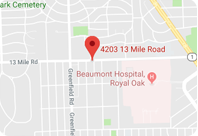Diabetic Retinopathy
Diabetic Eye Disease
What is Diabetic Retinopathy?
Diabetes is one of the top causes of blindness, afflicting millions of Americans. Patients with diabetes are at an increased risk of developing eye diseases that can lead to vision loss and blindness. It is important for diabetic patients to have their eyes examined at least once a year. Early Detection of this eye disease is key and can help prevent permanent damage. The risk of developing eye problems can be reduced through regular eye exams and by keeping blood sugar levels under control through a healthy diet and regular exercise. Diabetic retinopathy is an eye disease of the retina and may cause a loss of vision if not diagnosed and treated early. This eye disease can progress without any symptoms, and the disease can go undetected. It is important to have routine eye exams to check for diabetic retinopathy.
DID YOU KNOW?
Blood sugar levels affect the clarity of vision seen
Diabetic retinopathy is a complication of diabetes that weakens the blood vessels that supply oxygen to the retina(back part of your eye). These weak vessels can leak, swell or develop thin branches, causing a loss of vision. Changes to your vision may not be noticeable at first. In its advanced stages, the disease can cause blurred or cloudy vision, floaters, blind spots, and eventually blindness. This damage is irreversible. Diabetic retinopathy is the most common diabetic eye complication and a leading cause of blindness in American adults. Fluid can leak into the center of the macula, the part of the eye where central vision occurs. The fluid makes the macula swell, which in turn blurs the vision. This condition is called macular edema and often occurs with diabetic retinopathy.
Fortunately, diabetic retinopathy is preventable. Your risk is reduced if you follow your prescribed diet and medications, exercise regularly, control your blood pressure, and avoid alcohol and cigarettes. Regular eye exams are an integral part of making sure your eyes are healthy. Often there are no symptoms or pain in the early stages of the disease. Don’t wait for symptoms. Be sure to have a comprehensive dilated eye exam at least once a year.
Although damage caused by diabetic retinopathy cannot be corrected, patients diagnosed with the condition can be treated to slow its progression and prevent further vision loss. Treatment modalities include laser and surgical procedures.
Dr. Max T. Walsh and Dr. Christopher R. Walsh are considered to be a leading authority on Diabetic Eye Disease in the Royal Oak and Novi area. They have several years of experience and training in treating Diabetic Eye Disease patients and helping them overcome this discomforting condition.
Call us today to Schedule an appointment Royal Oak (248) 288-2222 Novi (248) 474-8000









